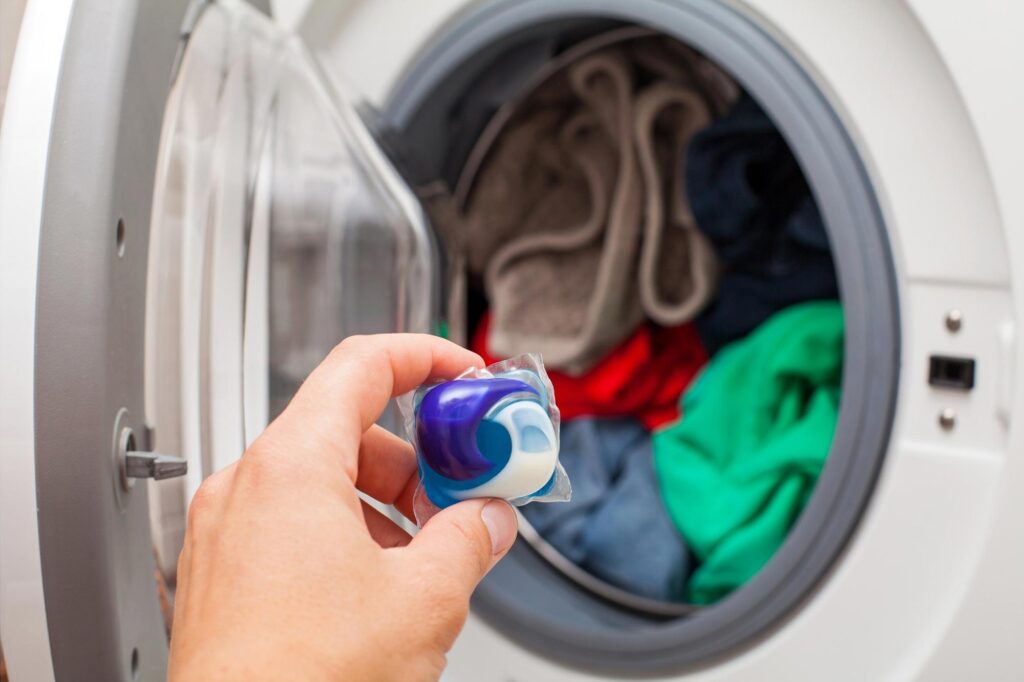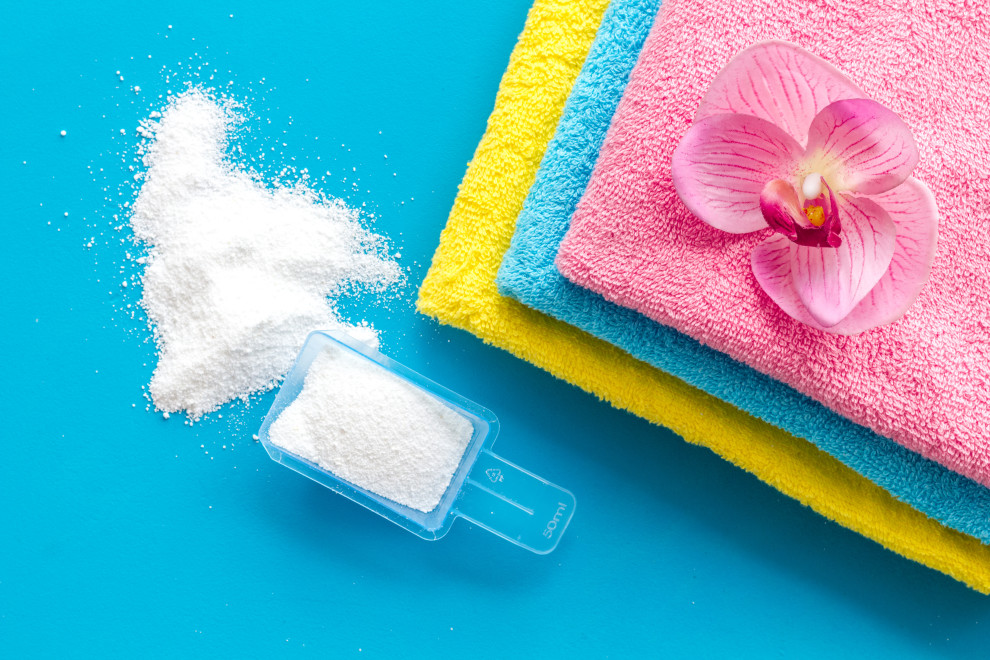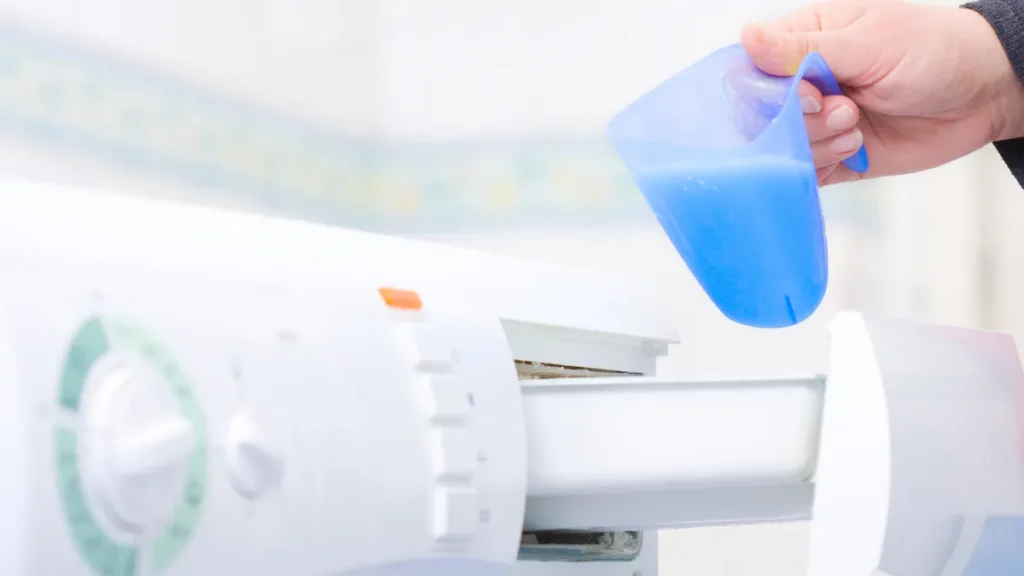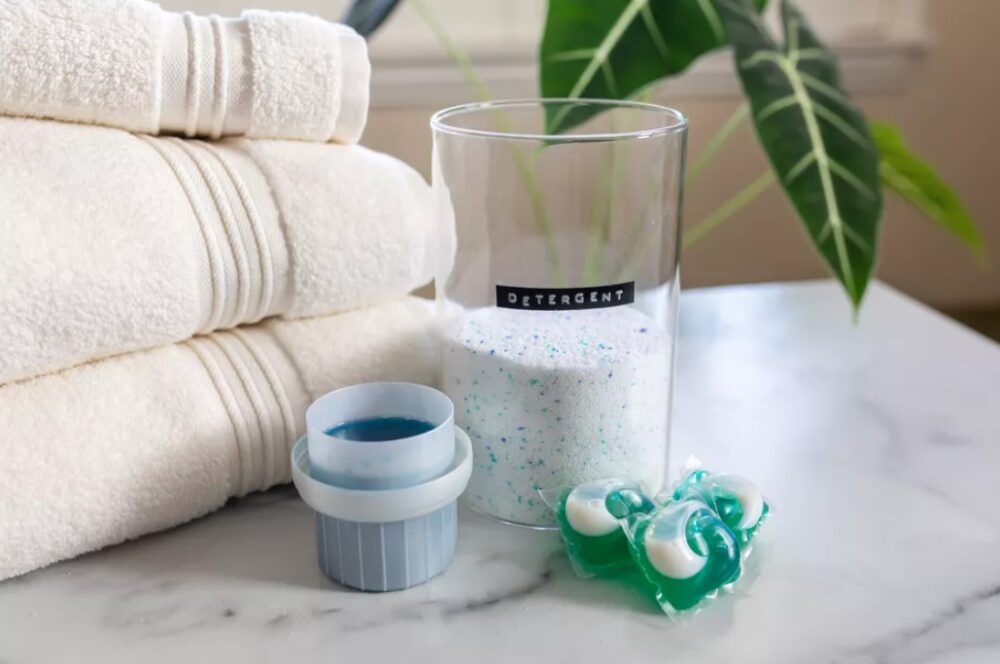When wandering down the laundry aisle, it’s amazing to see the vibrant colors of all the different laundry detergent options. There are many different bottles and containers to choose from, and sometimes, that alone can be a challenge.
When choosing laundry detergent to take home, you have the choice of laundry pods, powder detergent, and liquid detergent. When reading the labels, they all seem the same, so which is the best laundry detergent product?
Pods, Powder, or Liquid?
Historically, soap was rendered from animal fat and ashes, and at one point, lye was the popular soap product. In medieval times, soap was associated with the devil, and there was a decline in soap products; some believe this helped the spread of the black plague. It wasn’t until the 1950s that laundry detergent became a popular purchase.
When it comes to laundry detergents, consumers have three options: pods, powder, and liquid laundry detergent. The three forms all work well in standard top-load washers. All three come with their own advantages and disadvantages, and all three work well for different people.
Pods

Source: scitechdaily.com
Laundry pods emerged in 2012, created by Procter & Gamble. However, this was when the pods finally became popular and mainstream as TidePods; in the mid-20th century, Procter & Gamble attempted to release several different forms of laundry tablets that were not successful.
The 2012 version of laundry pods became successful because of how powerful they are; the detergent within the pods is more concentrated than liquid detergents and proved triumphant in fighting stains. Now, it seems like laundry pods are here to stay.
Laundry pods are great for both front-loading and top-loading washing machines. Front-loading washers use less water, so a detergent that is high-efficiency is needed, like laundry pods. Top-loading washers have more water, so the pods dissolve faster.
Advantages
Using laundry pods has multiple advantages.
- The handling and storage of laundry pods are the easiest because they are compact and lightweight.
- Laundry pods are easy and straightforward to use.
- The chances of wasting laundry pods are smaller because they are already pre-measured.
- The small packets of laundry pods produce minimal waste, unlike other options.
- When used, laundry pods are unlikely to leave a residue.
- Laundry pods are made from a stable formula for a satisfactory cleaning result.
Disadvantages
While there are many benefits to using laundry pods, they have several disadvantages as well.
- Laundry load sizes can vary, which means laundry pods can either contain too little or too much detergent for certain loads.
- Laundry pods are very expensive because of their many advantages.
- Laundry pods cannot be used in pre-treating stains.
- The outer packaging of laundry pods is nonrecyclable.
- For both children and pets, laundry pods pose a hazard for poisoning.
Out of the different laundry detergent options, laundry pods pose the biggest hazard when they are not stored properly. Laundry pods can be colorful, which children can mistake for candy, and curious pets might develop an interest in them despite their smell. For homes that have smaller children and pets and use laundry pods, the detergent needs to be stored away, out of sight, and out of reach.
Powder

Source: getsetclean.in
Powdered laundry detergents are the longest surviving form of the detergent; they were invented around the 1930s, and they are the least expensive options. Because more consumers have moved to pods and liquids, there are very few options for powdered detergents available.
Advantages
There are a few advantages to using powder laundry detergent instead of other options.
- Powder laundry detergent is the more environmentally friendly option because they have recyclable packaging.
- This form of laundry detergent has additives, which makes powder laundry detergent suitable for almost every location, even locations that have hard water.
- Powder laundry detergent is usually the most affordable option.
- Compared to other detergents, like pods and liquids, powdered laundry detergent has a longer shelf life.
- Powder detergents come with a small measuring cup, which is easy to read and minimizes waste.
- Powdered laundry detergents have a strong cleaning mechanism, which makes them perform exceptionally with tougher stains.
Disadvantages
Below are several disadvantages of the use of powder laundry detergent.
- The packaging for powdered laundry detergent is often inconvenient because they are available in large, bulky packages.
- When exposed to moisture, powder detergents can cake together and be difficult to use.
- And cold water powdered detergent doesn’t completely dissolve, which can leave residue on fabrics.
- In regard to pre-treating stains, powdered laundry detergent is not an option.
Liquid

Source: cnet.com
Liquid laundry detergent was one of the two main forms of detergent in the 1950s, the era where they became popular. This type of laundry detergent is still the most popular form today because it distributes well in water, and there are a variety of scents it can be found in.
Advantages
A few advantages that come from using liquid laundry detergent are:
- Liquid laundry detergent is ready to use, which makes them an optimal choice for pre-treating stains.
- Even in cold water, liquid detergents dissolve easily, which makes them less likely to leave a residue.
- Works well when removing oil and grease stains because it can penetrate the fibers of the fabric.
- Liquid laundry detergent is suitable for washing all kinds of materials, even delicate fabrics.
- Work well within newer models of washing machines.
Disadvantages
Some of the disadvantages include:
- The bottled packaging of liquid laundry detergents contributes to waste.
- Compared to powder detergents, the formula of liquid laundry detergent is less stable.
- Because they are poured, liquid laundry detergents can easily be over-portioned and wasted.
- Liquid laundry detergent is heavier than other options, which makes their transportation less convenient.
- As much as 50% of liquid laundry detergent can be made up of water.
- Though the caps of detergent bottles contain measurements of recommended uses, the measurement lines on most of the bottle caps are difficult to read and can also contribute to overpouring.
So, with all this information, which form of laundry detergent is the best? Really, the best choice of laundry detergent depends on the individual and their needs. Different forms are going to work better for different people and different types of washers.















